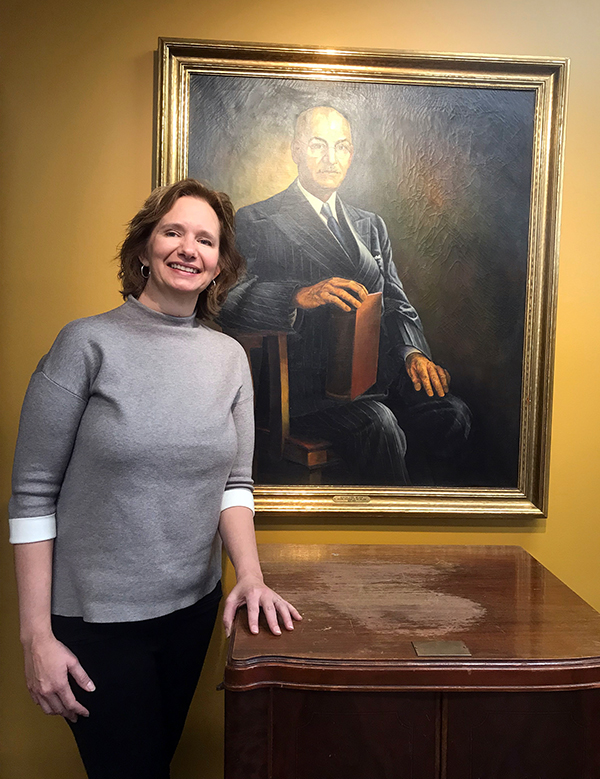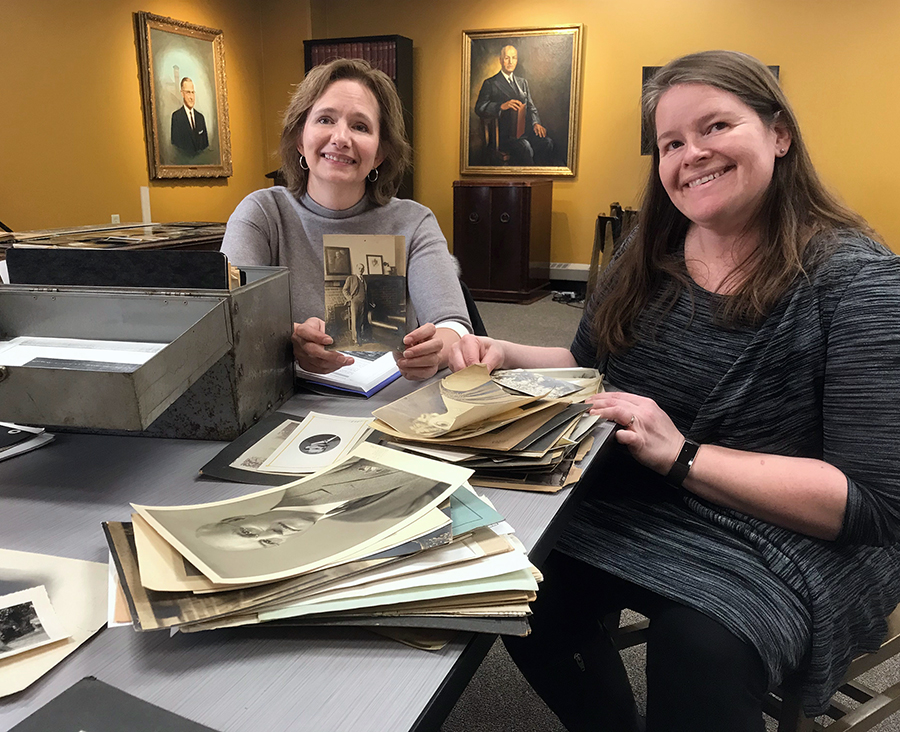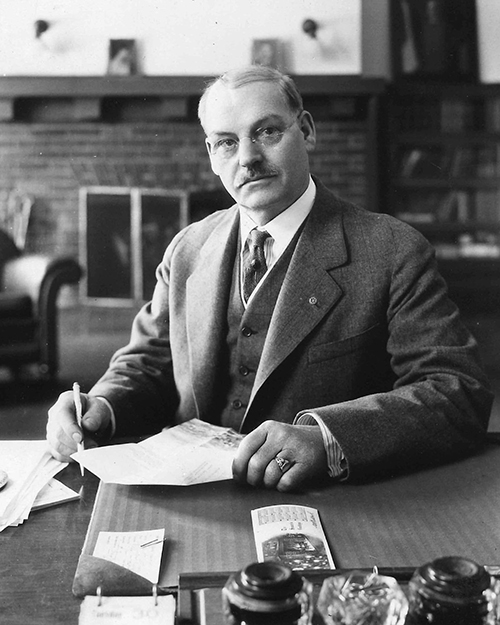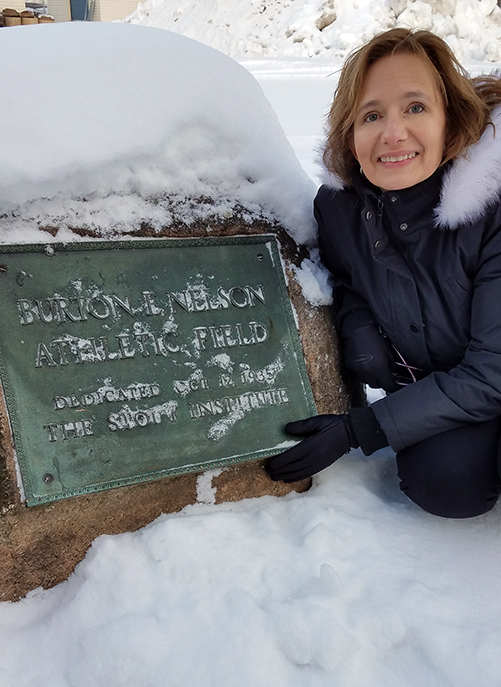Throughout her life, Stephanie Nelson Perry has heard stories and read family history about the many accomplishments of her great-grandfather, Burton Edsel Nelson.
Perry always wanted to learn more about him. Recently, on a trip from her home in Nashville, Tenn., to Manitoba, Canada, she did just that.
Perry stopped in Menomonie, the city where Nelson spent a third of his life and where he was president of University of Wisconsin-Stout from 1923 to 1945, when it was Stout Institute.
 He was the second leader and is the second-longest serving leader in UW-Stout’s 129-year history. Nelson Field, part of the original athletic complex, is named after him.
He was the second leader and is the second-longest serving leader in UW-Stout’s 129-year history. Nelson Field, part of the original athletic complex, is named after him.
A new UW-Stout leader, Chancellor-designate Katherine P. Frank, begins work March 1. She takes over a university with 45 buildings and about 8,500 students; back in Nelson’s day it had eight buildings and fewer than 500 students.
“He’s been a fascinating figure for me, and our family has always taken great pride in what he accomplished,” Perry said.
Perry toured UW-Stout with Jen Rudiger of Stout University Foundation and learned more about her great-grandfather’s legacy. She also met with University Archivist Heather Stecklein and brought along family photos, letters, genealogy, articles and other information that was scanned and saved.
While in Archives, on the fifth floor of the library, Perry saw for the first time Nelson’s official portrait, part of a gallery of portraits of school presidents and chancellors. It was painted in 1948 by noted artist George New after several sittings with Nelson, according to the book “An Idea Comes of Age: UW-Stout, 1891-2016,” a copy of which Perry received from the Foundation.
Two chapters of the book are devoted to the Nelson years.

Perry also visited Nelson’s old office, now a conference room in Harvey Hall.
‘He put his heart and soul into it’
Nelson retired in 1945 at nearly age 78. He vowed to see the school through World War II and “quit when Hitler quits.” He submitted his resignation the month after the German leader committed suicide.
 Nelson lived in Menomonie until 1957, when his wife died. He then moved to Syracuse, N.Y., to live with a son — Perry’s grandfather — and died in 1961. A funeral was held in Menomonie, and he was buried in Evergreen Cemetery, where several other UW-Stout leaders are buried, including founder James Huff Stout.
Nelson lived in Menomonie until 1957, when his wife died. He then moved to Syracuse, N.Y., to live with a son — Perry’s grandfather — and died in 1961. A funeral was held in Menomonie, and he was buried in Evergreen Cemetery, where several other UW-Stout leaders are buried, including founder James Huff Stout.
A native of Pennsylvania, Nelson had teaching and education leadership positions in Illinois and in Racine prior to being hired at Stout Institute. “He loved Wisconsin and spent most of his life here,” Perry said.
His accomplishments at UW-Stout were many, not the least of which was keeping the school afloat despite large state budget cuts during the Great Depression and the challenges of WWII, when enrollment slumped from 600 to 280, according to the book.
“He brought the school through pretty difficult times and provided a sound base that helped it grow,” Perry said. “He seemed like he put his heart and soul into it.”
While Nelson was president, the Stout Student Association – student government — was formed; the university received national accreditation; the Graduate School began; the remaining two-year programs were phased out to focus on four-year degrees; and the physical campus expanded with the addition of the historic Louis Smith Tainter House, the athletic fields and Lynwood Hall.
Lynwood Hall, since torn down, was on Wilson Avenue east of Harvey Hall. Seeing a pressing need for more student housing, Nelson purchased it himself before the state bought him out in 1925. It became the first men’s residence hall in 1929, according to “An Idea Comes of Age.”
 Nelson Field
Nelson Field
Nelson also expanded the athletic facilities. He pushed for the purchase of 10 acres four blocks south of the existing campus to create a football field and other fields. Students petitioned the state Board of Trustees to name it Burton E. Nelson Field, which was dedicated during the 1935 homecoming football game.
The fields gave the school a literal direction: It has since expanded south to the athletic complex.
During her visit, Perry went to Nelson Field, which is being upgraded with artificial turf for the women’s soccer team and recreational uses. Perry found the dedication plaque, which was covered with snow.
Nelson was known as a students’ president. He relaxed curfew and women’s uniform rules and expanded homecoming. Instead of calling him president, students affectionately nicknamed him “Prexy,” according to the book.
He volunteered with many nonprofits, was on the Wisconsin Welfare Council and was a district governor for Rotary International. Through Rotary, he helped bring international students to campus.
“After reading many of my great-grandfather’s personal letters to his family, he seemed like he was a very kind man,” Perry said.
At his retirement dinner in 1945, Nelson thought about all that had been done in his nearly 23 years at the helm of Stout Institute and said, “What has been accomplished is the result of teamwork.”
###
Photos
Stephanie Nelson Perry saw the official portrait of her great-grandfather, Burton Nelson, when she visited UW-Stout recently for the first time. In front of the portrait is a cabinet that belonged to Nelson, who was school president from 1923-45.
Perry provided University Archivist Heather Stecklein, right, with photos and family history related to her great-grandfather, former UW-Stout President Burton Nelson. Between them in the background is Nelson’s portrait.
Stout Institute President Burton Nelson sits in his Harvey Hall office in 1936.
Nelson Field at UW-Stout was named after Burton Nelson when it was dedicated in 1935, while he still was president. His great-granddaughter, Stephanie Nelson Perry, pushed away snow to see the dedication plaque during a recent visit to campus.






